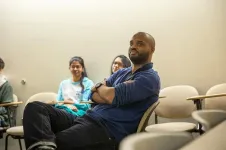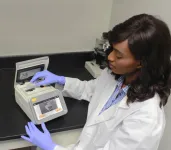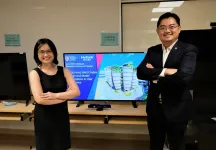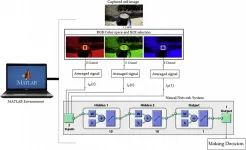(Press-News.org) PROVIDENCE, R.I. [Brown University] -- Proposals to create a national gun registry have long been met with fierce opposition from gun rights advocates. While proponents say a registry would help in tracking guns used in crimes, opponents worry that it would compromise privacy and could be used by the federal government to confiscate firearms. Now, a team of Brown University computer scientists has devised a way of implementing a registry that may allay some of those concerns.
They propose a database that uses advanced encryption to protect privacy. The encryption scheme allows the database to be searched without being decrypted, which means people querying the database see only the records they're looking for and nothing else. Meanwhile, the system places control of data in the hands of county-level officials rather than the federal government, meaning county officials have control over which queries are answered, and can even pull the county's data offline entirely if they're not comfortable with how it's being used.
The proposed system is the work of Seny Kamara, a professor of computer science at Brown, along with co-authors Tarik Moataz, Andrew Park and Lucy Qin. Moataz is a visiting scientist at Brown. Park is a Brown master's student, and Qin is a Ph.D. student in Kamara's lab. They developed the system after Ron Wyden, a U.S. Senator from Oregon, contacted them looking for ideas on how such a database might be constructed.
"The senator's office had this idea for a database where counties are incentivized to participate, but they could pull out at any time," Kamara said. "At the same time, there are obvious privacy concerns. This idea of being able to query and process data without decrypting it is something I have worked on for the last 20 years, so that's why the senator reached out to us. This research was about showing whether it was possible to design something like this."
The study, which was accepted to the IEEE Symposium on Security and Privacy and will be presented in May, concludes that such a system is not only possible, but quite practical.
The proposed registry would contain the make, model and serial number of all legally owned guns in each participating county, along with a registration number identifying gun owners. The information in each county database would be fully encrypted, and only a designated county official would hold the key to decrypting their own local data.
Each county's encrypted data would be searchable by authorized users elsewhere (authorized users would include law enforcement, county officials or gun sellers). For example, a law enforcement officer might query the system with the serial number of a gun found at a crime scene. Without ever decrypting the data, the system would locate the county database containing that serial number. The officer would then be able to decrypt the relevant record, as long as the country official controlling the data has enabled it to do so.
The search algorithm provides a high level of security because the data is never decrypted during the search process.
"All of the servers that are storing the data and all of the computers that are doing these operations, they're just processing encrypted data and they never actually see anything," Kamara said. "That provides really strong privacy throughout the process because none of the data can ever be seen without the decryption key."
Kamara and his colleagues envision the decryption key as a physical device -- like a thumb drive -- that can be placed in a local computer to authorize transactions.
"If at some point a county decides they don't want to be part of the system anymore, the official just pulls that hardware token out of the laptop and that's it -- nothing works," he said. "The data is encrypted and the key is unavailable, so nothing can happen. For the senator's office, that ability for counties to walk away and basically pull their data offline was really important."
For their study, the researchers created a mock-up of the database with synthetic data and showed that searches were computationally practical, with results returned in a minute or less. The analysis also found that the costs associated with the system would be relatively small. Each county database could be stored for less than $1,000 per year, and the global directory would cost less than $500 per year.
Kamara says that the work so far is a proof-of-concept that would require some additional refinement to be implemented. But as it is, he says, the work shows the value of bringing technical expertise to bear on policy issues.
"I think people imagine this registry and think everything would be public and there would be all kinds of problems associated with that," he said. "But with advanced cryptography, that's not necessarily true. So I think this is an example of how you can have technology folks and policymakers working in concert, and it changes the conversation. It's been a really great collaboration."
INFORMATION:
Lemurs can use their sense of smell to locate fruit hidden more than 50 feet away in the forest--but only when the wind blows the fruit's aroma toward them, according to a study published in the American Journal of Physical Anthropology.
"This is the first time research has demonstrated that primates can track a distant smell carried by the wind," said anthropologist Elena Cunningham, a clinical associate professor of molecular pathobiology at NYU College of Dentistry and the study's lead author.
Many animals use their sense of smell to locate food. However, less is known about whether primates can smell food that is far away, or if they instead rely on visual cues or memory to find their next meal.
Because many primates--including ring-tailed lemurs, ...
CORVALLIS, Ore. - Oregon State University researchers analyzed more than 17,000 public comments focused on orca conservation in the state of Washington and found that the most common emotional sentiments were trust, anticipation and fear.
The recently published findings have important implications because they provide conservation managers a way to convert a large volume of information to a manageable amount that can help them understand why people might support or reject management actions, the researchers said.
"Emotions are intertwined in our decision-making, often playing a substantive role in public evaluations of conservation policies," said Kelly Biedenweg, an author ...
(Portland - March 15) Results of a clinical study conducted by researchers in Manaus, Brazil, show that the Gazelle® Malaria test outperformed Rapid Diagnostic Tests (RDTs) and was nearly as accurate as more expensive and time-consuming expert microscopy in detecting Plasmodium vivax (P. vivax) malaria. The data was published Friday, March 12 in the Malaria Journal.
The double-blind study was based on 300 participants who sought care from Fundac?a?o de Medicina Tropical Doutor Heitor Vieira Dourado (FMT-HVD), located in Manaus, an area in the Western Brazilian Amazon, heavily endemic for P. vivax.
"Because P. vivax is not adequately detected by current tests, the infection is frequently missed, and patients don't receive essential treatment," said ...
Copper nanomaterials with a cubic shape so perfect that they form neatly aligned stacks when brought together have been created by researchers at KAUST. The cuboid copper nanoclusters, developed by rational design, are a new member of an exotic nanomaterial family that has shown many promising properties but has remained very hard to make.
"Copper nanomaterials are a class of materials that exhibit useful properties for the fields of photoluminescence and catalysis," says Ren-Wu Huang, a postdoc in Osman Bakr's lab, who led the research. There is great interest in synthesizing new copper nanomaterials to understand how their structure influences their function.
Copper nanoclusters, which are of an atomically precise structure, are among the few copper nanomaterials that ...
An interdisciplinary, multinational research team presents a new class of chemical compounds that can be reversibly oxidized and reduced. The compounds known as 'pyrazinacenes' are simple, stable compounds that consist of a series of connected nitrogen-containing carbon rings. They are suitable for applications in electrochemistry or synthesis, as the researchers describe in the science journal Communications Chemistry.
Redox reactions play an important role in our everyday life. In these reactions, one compound releases electrons and is oxidized, while another accepts ...
A discovery by University of Queensland pain researchers may allow some future cancer patients, including children with leukaemia, to avoid their chemotherapy's worst and most debilitating side effects.
Professor Irina Vetter and Dr Hana Starobova thought "turning off" the inflammation that is one of the body's natural reactions to the chemotherapy drug vincristine might reduce its accompanying pain and unpleasant symptoms.
"We found the anti-inflammatory drug anakinra substantially reduced the awful nerve symptoms for which vincristine chemotherapy is known," Professor ...
A study by a research team from Nanyang Technological University, Singapore (NTU Singapore) and China's first digital-only bank WeBank has found that security, service quality and system quality are the most important factors for customers who use mobile banking.
Two in five respondents (40%) said that the security they felt while carrying out transactions on mobile applications was their most important consideration.
This was followed by the level of service quality (25%), which referred to whether the banking applications could fulfil users' needs, such as carrying out transactions and easy access to credit card services.
System quality, which considers the performance of the application, including ...
Researchers at UniSA have developed a cost-effective new technique to monitor soil moisture using a standard digital camera and machine learning technology.
The United Nations predicts that by 2050 many areas of the planet may not have enough fresh water to meet the demands of agriculture if we continue our current patterns of use.
One solution to this global dilemma is the development of more efficient irrigation, central to which is precision monitoring of soil moisture, allowing sensors to guide 'smart' irrigation systems to ensure water is applied at the optimum time and rate.
Current methods for sensing soil moisture are problematic - buried sensors are susceptible to ...
Dr Daniel Montesinos is a Senior Research Fellow at the Australian Tropical Herbarium, at James Cook University in Cairns. He is studying weeds to better understand (among other things) how they might respond to climate change.
He said most invasive plants are characterised by their rapid pace when it comes to taking up nutrients, growing, and reproducing - and they're even faster in the regions they invade.
"New experiments comparing populations from distant regions show a clear trend for already-fast invasive plants to rapidly adapt even faster traits in their non-native regions," Dr Montesinos said.
This is further pronounced in the tropics and sub-tropics.
"Even though invasives' growth rates are already among the highest for plants, when they invade new territory ...
A new concept of on-demand drug delivery system has emerged in which the drugs are automatically released from in vivo medical devices simply by shining light on the skin.
A research team led by Professor Sei Kwang Hahn of the Department of Materials Science and Engineering and Professor Kilwon Cho of the Department of Chemical Engineering at POSTECH have together developed an on-demand drug delivery system (DDS) using an organic photovoltaic cell coated with upconversion nanoparticles. This newly developed DDS allows nanoparticles to convert skin-penetrating near-infrared (NIR) light into visible light so that drug release can be controlled in medical ...





